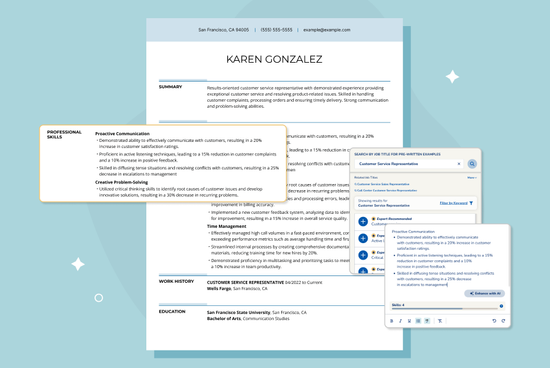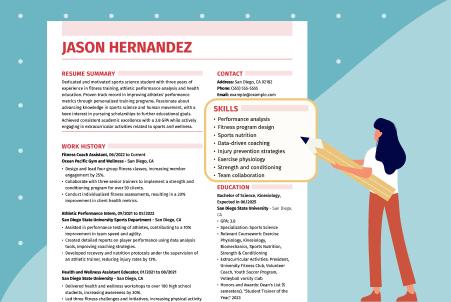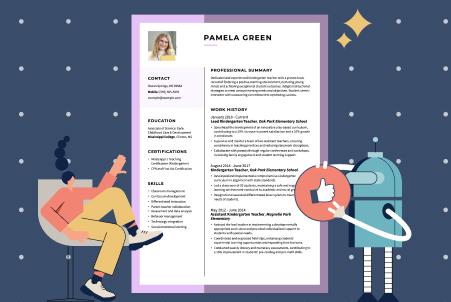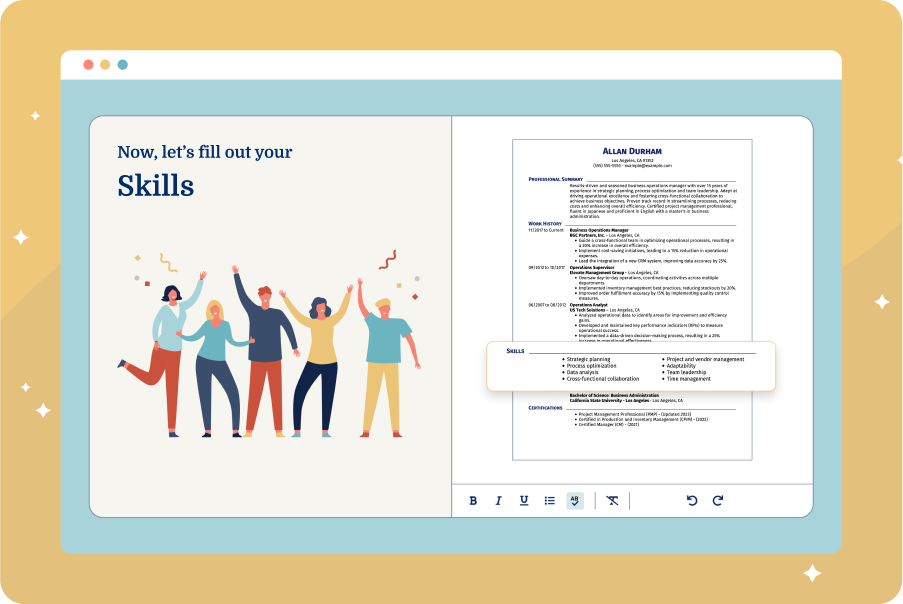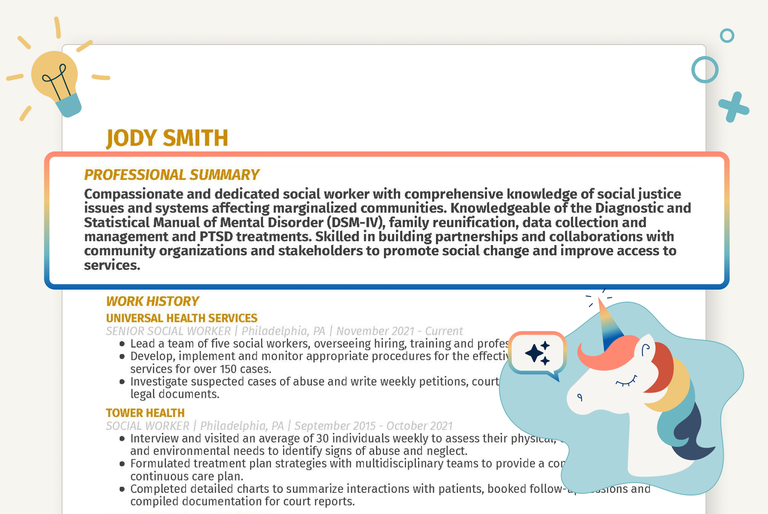Writing a Skills-Based Resume: Template & Guide

Our customers have been hired at: *Foot Note
Table of Contents
Get started with MyPerfectResume today!
- Build a resume on any device
- Pick an ATS-friendly template
- Tailor with AI copy suggestions
In today's fast-changing job market, how you tell your career story matters more than ever. Enter the skills-based resume — a powerful tool that highlights what you can do, not just where you've been.
Whether you’re changing industries, reentering the workforce, or simply want to highlight your strongest abilities, a skills-based resume can set you apart.
In this article, we'll break down what makes this format so effective, when to use it, and how to craft one that grabs attention and opens doors.
Jump to the following section:
What Is a Skills-Based Resume?
A skills-based resume, or functional resume, emphasizes your abilities and competencies over your work history and educational credentials.
This resume format showcases what you can do and what qualifications you possess rather than where and when you acquired those skills.
Most skills-based resumes include a summary of qualifications and categorized skills lists to provide an in-depth view of your competencies.
Who Should Use a Skills-Based Resume?
Chronological resumes are ideal for candidates with a consistent employment history that is relevant to their target role.
On the other hand, skills-based resumes are useful for candidates who want to highlight specific skills that may not be evident from their work experience alone.
Below are a few examples of job seekers who might opt for a skills-based resume rather than a traditional chronological resume:
- Recent graduates: Individuals who have recently completed their education and have limited work experience can highlight their academic achievements, internships, projects, and extracurricular activities to demonstrate their skills and potential.
- Career changers: Those transitioning into a new industry or field can use a skills-based resume to emphasize transferable skills and relevant experiences, even if they lack direct work experience in the new field.
- Freelancers or contract workers: Freelancers, consultants, and contractors who have worked on multiple projects for different clients can use a skills-based resume to showcase their diverse expertise, rather than focusing solely on a linear work history.
- Job seekers with employment gaps: Those addressing employment gaps on a resume due to reasons such as caregiving responsibilities or health issues can use a skills-based resume to redirect the focus away from gaps and highlight relevant skills.
- Individuals with varied work experience: People with diverse work experiences across multiple industries or roles can use a skills-based resume to tie together their experiences under related skill sets and competencies.
- Candidates with nontraditional backgrounds: Individuals with unconventional career paths can use a skills-based resume to showcase the skills they've acquired outside of traditional employment settings.
Our library of resume examples features dozens of skills-based resume examples and other resume formats you can use to inspire your writing.
How to Write a Skills-Based Resume
Follow the tips below to write an effective resume that highlights your strongest skills.
Craft a compelling resume summary
Your resume summary is the first chance to showcase how your skills align with the job requirements.
Introduce yourself to the hiring manager in three to five sentences, highlighting your key skills and applicable experiences.
Below is an example of a resume summary for a project manager transitioning into software development:
“Motivated project manager with a proven track record of successfully leading cross-functional teams and delivering projects on time and within budget. Proficient in project management methodologies, with a solid foundation in programming languages such as Python and Java. Recognized for exceptional organizational skills, problem-solving abilities, and a collaborative approach to project execution. Eager to apply management expertise and technical acumen to contribute to developing innovative software solutions in a dynamic team environment.”
This summary communicates the candidate’s transferable skills, highlighting their project management experience while emphasizing their readiness to transition into a new field.
We also recommend exploring our About Me resume examples for guidance on introducing yourself in your resume.
Identify and categorize your skills
A well-organized resume skills section is the key component of a skills-based resume.
Start by identifying keywords in the job description that signal the critical skills and expertise the employer seeks, to determine which ones align with your qualifications.
Next, select three to five skill categories that match your background and the role's requirements. These are the primary skill sets that you will add to your resume skills section.
Under each skill category, add three quantifiable achievements to demonstrate your proficiency and impact in each area.
Remember to start each bullet point with a powerful action verb to convey your impact clearly and confidently.
To get started, refer to the sample skills section below.
PROFESSIONAL SKILLS
Project Management
- Led a cross-functional team of 10 members to successfully launch a new product, resulting in a 20% increase in revenue within the first quarter.
- Implemented Agile project management methodologies, resulting in a 30% improvement in project delivery time and a 15% reduction in budget overruns.
- Developed and maintained detailed project plans, schedules, and budgets, ensuring on-time and on-budget completion for multiple projects.
Software Development
- Developed and deployed a customer relationship management (CRM) system using Python and Django, resulting in a 25% increase in client retention rates.
- Designed and implemented a responsive web application using React.js, resulting in a 40% improvement in user engagement metrics.
- Conducted code reviews and implemented best practices, resulting in a 20% reduction in software bugs and a more stable product release cycle.
Problem-Solving
- Identified and resolved critical technical issues, minimizing downtime and ensuring uninterrupted client service.
- Implemented process improvements to streamline workflows and increase operational efficiency, resulting in a 20% reduction in production costs.
- Led root cause analysis efforts to investigate recurring issues, implementing corrective actions to improve overall system reliability.
Try our AI Resume Skills Generator to get tailored skills you can include in your resume and ensure your job application showcases your most impressive abilities.
AI Resume Skills Generator
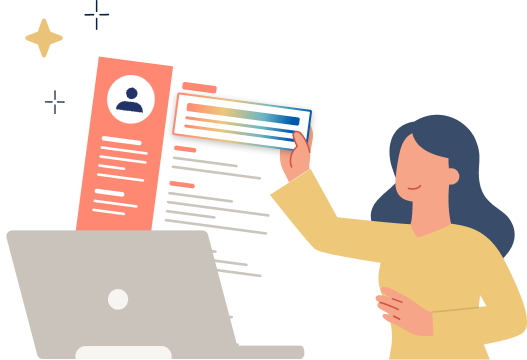
Add relevant professional experience
Although your skills-based resume should primarily focus on your core competencies, you should also include a concise work history section featuring relevant roles or experiences.
List prior jobs in reverse-chronological order, including the job titles, company names, and dates of employment.
Below is an example of a work history section for a skills-based resume.
WORK HISTORY
Software Developer
Porch Group | Seattle, WA
March 2023 – Present
Project Manager
Smartsheet | Bellevue, WA
June 2017 – March 2023
If you do not have paid work experience, you can feature relevant projects or volunteer experiences demonstrating your skills and competencies.
Explore our guide on writing a resume without experience for additional direction on crafting a resume when you are in the early stages of your career or changing fields.
List your academic credentials
If you have pertinent educational credentials, list them in a dedicated education section at the bottom of your resume.
See how to list education on a resume for examples and formatting tips from career advice experts.
Refer to the example of a skills-based resume education section below to get started.
EDUCATION
Bachelor of Arts in Business Administration
University of Washington | Seattle, WA
Include relevant certifications
If you have any relevant certifications, list them in a separate section on your resume. For each certification, include the issuing organization, date earned, and a brief description.
Certifications demonstrate that you possess relevant technical skills and competencies gained outside of formal education or past work experience.
The sample below demonstrates how to list certifications on a skills-based resume.
CERTIFICATIONS
Project Management Professional (PMP)
- Project Management Institute (PMI)
- Date Earned: January 2025
- Description: Internationally recognized certification demonstrating proficiency in project management principles, practices, and methodologies.
Certified ScrumMaster (CSM)
- Scrum Alliance
- Date Earned: May 2023
- Description: Certification validating knowledge and expertise in Scrum framework and Agile project management practices.
Microsoft Certified: Azure Fundamentals
- Microsoft
- Date Earned: November 2017
- Description: Certification demonstrating foundational knowledge of Microsoft Azure cloud services and solutions.
Feature optional resume sections
You do not need to limit yourself to the skills section of your resume to showcase your applicable qualifications and abilities.
For example, sales professionals selling products in international markets may need language skills to communicate with clients and negotiate deals effectively.
In this scenario, a job seeker might include a “Languages” section on their resume to list their foreign language proficiency.
Here are some additional sections that you can include on your resume to highlight relevant skills, qualifications, and experiences:
- Projects
- Awards and honors
- Publications
- Extracurricular activities
- Leadership experience
- Licenses
- Volunteer experience
- Relevant coursework
- Internship experience
- Research
Once your resume is complete, we recommend using our ATS Resume Checker to scan for common errors and receive optimization suggestions.
Skills-Based Resume Template
You can follow the skills-based resume sample template below to start crafting your resume. See what a resume looks like for additional examples and formatting tips.
[Your Contact Information]
[Three to five sentences detailing your professional background and touching on the key qualifications that make you a great fit for the role.]
PROFESSIONAL SKILLS
[Skill Category]- [Relevant experience or accomplishment.]
- [Relevant experience or accomplishment.]
- [Relevant experience or accomplishment.]
- [Relevant experience or accomplishment.]
- [Relevant experience or accomplishment.]
- [Relevant experience or accomplishment.]
- [Relevant experience or accomplishment.]
- [Relevant experience or accomplishment.]
- [Relevant experience or accomplishment.]
WORK HISTORY
[Job Title][Company Name], [Location]
[Dates of Employment]
EDUCATION
[Degree] in [Field of Study][University/College Name], [Location]
CERTIFICATIONS
- [Certification/License 1]
- [Certification/License 2]
- [Certification/License 3]
We recommend browsing our professional resume templates for expertly crafted templates that you can edit directly in our Resume Builder and download in your preferred file format.
Skills to Feature on Your Resume
With the rise of skills-based hiring practices, many companies are focusing more on skills and less on traditional markers of success, such as years of experience or education.
Job seekers need to showcase the skills that hiring managers seek to demonstrate their fit for the job.
MyPerfectResume’s sampling of 25,000 resumes from 2023 found that the following soft skills were the most frequently listed by job seekers:
- Time management
- Customer service
- Critical thinking
- Active listening
- Attention to detail
- Verbal and written communication
- Teamwork and collaboration
- Microsoft Office
- Problem-solving
- Project management
Additionally, the sampling identified the following as the most commonly listed hard skills:
- Project management
- Microsoft Excel
- Python
- SQL
- Javascript
- C
- HTML
- Java
- CSS
A skills-based resume is an excellent place to showcase these skills. Remember to tailor your resume by aligning your skills with the ones listed in the job description.
Key Takeaways
- A skills-based resume is a resume format that emphasizes skills and competencies rather than focusing on work history.
- Skills-based resumes are an excellent choice for job seekers with limited experience or job seekers who are changing fields or have nontraditional career paths.
- The skills section of your skills-based resume should include three to five key skill areas with concrete examples demonstrating your impact in each area.
- You can also showcase skills and qualifications in optional resume sections such as certifications, languages, or awards and honors.
- Tailor your resume to your target role by incorporating the key skills and competencies listed in the job description.
FAQ
How many skills should you list on a resume?
When writing a resume based on skills, the number of skills you list can vary depending on your experience level and the relevance of your skills to the job you are applying for.
Typically, a skills-based resume should include three to five skill groups with concrete examples under each one demonstrating how you have applied them during past experiences.
Prioritize the most important and impressive skills at the top of your list, especially those directly related to the job requirements.
Include a mix of technical skills, leadership abilities, interpersonal skills, and any other relevant competencies.
Is a skills-based resume better than a traditional resume?
The choice between a skills-based resume and a traditional chronological resume depends on your unique background, career goals, and the employer’s or industry’s expectations.
Skills-based resumes offer distinct advantages for those with nonlinear career paths, career changers, or individuals with experiences or upskilling that a traditional resume may not fully capture.
However, if you have consistent work experience, a chronological resume is a more suitable format for showcasing your career progression and growth.
Should I list skills or experience first on a resume?
Listing experience first on your resume is preferred if you have extensive work experience directly relevant to the position you’re seeking.
This approach allows you to highlight your career progression and accomplishments, providing context for your skills and demonstrating your ability to excel in similar roles.
If your work experience is limited or fragmented, listing your skills and competencies upfront effectively demonstrates that you learned the required skills through alternative routes.
This is particularly beneficial for recent graduates, career changers, or individuals with diverse skill sets who may not have a traditional career trajectory.
How we reviewed this article
Since 2012, we have helped more than 11 million job seekers. We want to make your career journey accessible and manageable through our services and Career Center’s how-to guides and tips. In our commitment to bring you a transparent process, we present our Editorial Process.
Our customers have been hired at:*Foot Note
